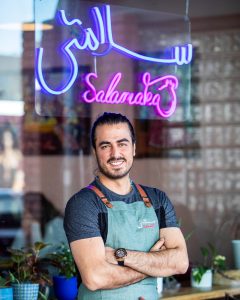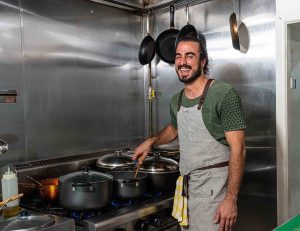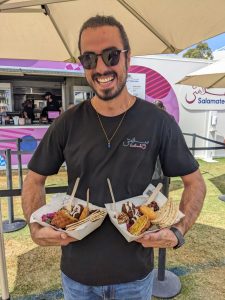Sun shines finally on Persian chef
Twelve years after he fled Iran in fear of his life Melbourne chef and humanitarian Hamed Allahyari can now call Australia his forever home.
As asylum seekers, Hamed and his family lived in limbo as they tried to rebuild their lives in Australia.
Recently, he was granted permanent residency and is now able to plan his future.
For Hamed that means opening his second café.
For five years, he has been running the Salamatea Café in Sunshine, a social enterprise that employs other refugees and new migrants.
 Now, he plans to open Sunshine Kababi, a traditional Iranian char grill.
Now, he plans to open Sunshine Kababi, a traditional Iranian char grill.
“The feeling is great at the moment. It’s good to get my residency and I’m really excited about our new restaurant,” he said.
“We have a grand opening coming up soon. The place will have the vibe of Iranian street food of 25 years ago.
“We will have great food but also beautiful décor, produce by an interior designer.
“And it means we will be able to offer opportunities to even more people. Over the past five years at Salamatea, we have trained 55 people in hospitality.
“People new to this country can find it hard to get job because they have no local experience, so we have been offering job opportunities and training to refugees and new migrants.
“For me, it is way of giving back because I was given opportunities when I first arrived in Australia.”
 Apart from his cafes, Hamed has produced a cookbook called Salamati and he runs cooking classes.
Apart from his cafes, Hamed has produced a cookbook called Salamati and he runs cooking classes.
He also has a catering business and was a food and hospitality provider at the Australian Open tennis tournament.
In 2012 Hamed was running a traditional Persian restaurant in Tehran when he fell foul of the morality police.
The police were told he had abandoned the Islamic faith, the compulsory religion of theocratic Iran, and Hamed was forced to flee with his wife, who was four months pregnant at the time.
“When I was 19 years old, I became an atheist. In my country, you are not allowed to do that and if the government finds out, you are going to be in jail or maybe they hang you,” Hamed said.
“So, couldn’t tell anyone but finally someone reported me, and the government found out and I left my country and left everything behind and came to Australia,” he said.
After making their way to Indonesia, the couple crammed into a small boat with 118 other people setting sail for Australia.
“We were on the ocean for 38 hours and we arrived on Christmas Island. We were lucky because the ocean was flat, not rough,” Hamed said.
“It was nighttime, about 3am, it was so scary, but I decided to get on the boat because I would have rather died on the ocean than die with my government. I said that to myself to make myself calm,” he said.
They ended up in detention on Christmas Island for five months before being given bridging visas and pair heading to Melbourne.
 It was two more years before Hamed was able to secure a work visa, but despite approaching dozens of restaurants, he couldn’t find a job.
It was two more years before Hamed was able to secure a work visa, but despite approaching dozens of restaurants, he couldn’t find a job.
“It was not nice going around all of those restaurants and having people say ‘no’,” he said.
“If you have a job, you are making money, you can buy your things, you meet people and become part of a community,” Hamed said.
Eventually, while volunteering at the Asylum Seeker Resource Centre (ASRC), he found paid work with Free to Feed, a pop-up cooking school where all classes are run by asylum seekers and refugees.
Since then, his life in Australia has been defined by food.
At the ASRC he met his business partner, fellow volunteer Jen Morillas. On a mission to help other refugees and asylum seekers find work, they opened Cafe Sunshine & Salamatea in July, just over the road from the Sunshine train station.
The pair spent weeks making transforming a former West African cafe into their own creation, painting and installing custom-built furniture.
“I didn’t have work rights or study rights on my visa when I arrived and for two years. It was very difficult,” Hamed said.
“After I received my work rights, I realised my background was cooking and in my country I had my own restaurant, so I thought I would go and find a job somewhere in the city.
“I made my own CV, and I went to different restaurants talking to managers and owners. I knew all Iranian food and some Middle Eastern food, and I had lots of experience.
“The problem in those days was my level of English language. When I came to Australia, all I could say in English was ‘hello, how are you?’
“Some of the restaurants said they couldn’t take me because I didn’t have references or qualifications, so I couldn’t find a job.
“One person out of 50 called me back to say he had a job for me Friday and Saturday night, but it was washing dishes for $8 an hour.
“I was lucky to get that phone call because after that, I just gave up on the idea of going to a restaurant and I started volunteering so that I could have a reference.
“I volunteered at the ASRC in Footscray, and I was cooking for 200 people and I was cooking Iranian food.
“People would come to me and ask me about the food. I found out that not many Australians have tried Persian or Iranian food.
“Then one of my friends from the volunteering told me about a job opportunity for paid work at Free to Feed, a social enterprise in Northcote.
“That was the start of my professional food journey in Australia,” Hamed said.












